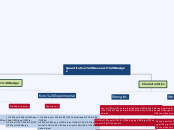Quantitative Research Designs
Research Design
Experimental
True Experimental
1. Pre- Test Design
2. Post- Test Design
3. Post- Test/only Control
Quasi-Experimental
1. Non-equivalent Control Group Design
2. Time Series Design
Pre-Experimental
1. One Shot Case Study
2. One Group Pre- Test
Post- Test Design
Non- Experimental
Descriptive
1. Survey
2. Correlational
3. Ex- Post Facto Studies
4. Comparative
5. Evaluative
6. Methodological
Characteristics
Strengths
Useful for obtaining data that allow
quantitative predictions to bemade
It is useful for studying large numbers of people
Provides precise, quantitative, numerical data
Data analysis is relatively less time consuming
The research results are relatively independent
of the researcher
Weaknesses
Researcher’s categories that are used might
not reflect local constituencies’ understandings
Researcher’s theories that are used might
not reflect local constituencies’
understandings
Researcher might miss out on phenomena occurring because of the focus on theory or hypothesis
testing rather than on theory or hypothesis generation
Knowledge produced might be too abstract
and general for direct application to specific local
situations, contexts, and individuals
